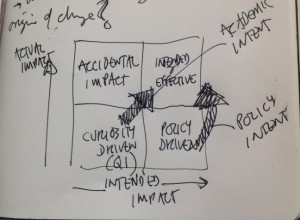David Phipps, RIR-York
On Tuesday September 25 , I cleared my morning so that I could be the only Canadian participant in a workshop on Policy Influence and Monitoring. The workshop was in Cornwall in the UK. I was in Toronto in Canada. WebEx and Skype connected us.
Le mardi 25 septembre, j’ai libéré ma matinée afin de pouvoir être le seul participant canadien à un atelier sur l’influence des politiques et le suivi. L’atelier avait lieu à Cornwall au Royaume-Uni. J’étais à Toronto, au Canada. WebEx et Skype nous ont mis en contact.
Knowledge intermediary work is a global phenomenon. Look at the K* conference in April 2012 that was attended by participants from 5 continents. There are well established practices to enhance the impact of research on policy and practice in developing countries seeded by international organizations like the International Development Research Centre (Canada) and the RAPID program of the Oversees Development Initiative in the UK plus many more. These organizations work with local Southern partners to enhance the impact of research on the lives of citizens in the Global South.
 Figure 1
Figure 1
I was invited by the Global Development Network (GD Net) to take part in a workshop on Policy Influence and Monitoring sponsored by the International Initiative for Impact Evaluation (3ie) who were working with a consortium lead by ODI and involving CommsConsult in UK and Zimbabwe, the Centre for Poverty Analysis (CEPA) in Sri Lanka and the Centro de Implementación de Políticas Públicas para la Equidad y el Crecimiento (CIPPEC) in Argentina. They came together to explore two questions:
- What is policy influence?
- How do we measure it?
There were about 20 participants in Cornwall plus Vanesa Weyrauch joining from Argentina, Peter da Costa joining from Kenya, Simon Batchelor based in the UK, also joining remotely and me… from Canada.
The workshop was interesting. Joining in remotely allowed me to learn from colleagues with whom I would never collaborate. It allowed me to share a Toronto case (York’s collaboration on the Heat Registry) of policy influence and what we learned from that case: start small; work with trusted and connected advocates; measure influence over time; seek a combination of qualitative and quantitative metrics; be open to serendipity. The figures in this blog were drawn based on one breakout group I attended by skype. The first is a framework for research and the potential for impact. The arrows in the second figure are knowledge mobilization moving research towards intentional impact.
 Figure 2
Figure 2
On September 25 knowledge intermediaries from UK, Zimbabwe, Argentina, Sri Lanka, Kenya and Canada came together to discuss the impact of research on policy. I am not certain we discovered anything earth shattering or revolutionary but coming together allowed us to synthesize across different experiences. I have blogged before about common knowledge intermediary themes emerging from diverse contexts. This is another instance of convergent evolution where knowledge intermediaries from around the world are asking the same questions, facing the same challenges but also finding commonality in approach. While our work is context specific, being aware of context is universal.
The workshop was also the launch of Research to Action, a new website « catering to the strategic and practical needs of people trying to improve the uptake of development research ». And speaking of the uptake of development research, some African universities are now seeking to apply their own research to benefit local communities by acting as knowledge intermediaries. Development Research Uptake in Sub Saharan Africa (DRUSSA) « provides direct support to universities at individual, institutional and systems levels to improve participation in and impact on policy and practice ». They are at the start of a five year program designed to build capacity for the management of research uptake (i.e. the application of research) in 24 universities.
I have the pleasure of serving as a Leader and Champion for the DRUSSA network. I have the pleasure of working with the ResearchImpact-RéseauImpactRecherche network of 6 Canadian universities who have invested in an institutional capacity to support knowledge mobilization. Six universities in Canada. Twenty-four universities in Africa. All of whom are developing a capacity to support research uptake and knowledge mobilization.
Convergent evolution indeed!
Read the DFID release for more information about the launch of Research To Action as well as the Research To Action blog.